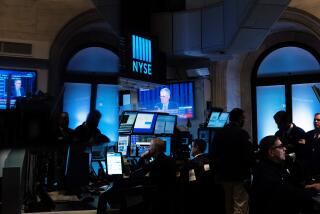Controversial Practice Halted by 2 Brokerages : Shearson and E. F. Hutton Suspend Program Trading for Their Own Accounts
- Share via
Shearson Lehman Bros. and E. F. Hutton Group said Friday that they were suspending computerized program trading for their own accounts, a move that could increase pressure on the securities industry to curb the controversial practice.
The giant brokerage firms, which are in the process of merging, said their action came in response to concerns by institutional and retail clients and their own brokers that program trading may exacerbate market volatility.
“Investor confidence is being eroded by the extreme volatility in today’s financial markets,” Shearson said in a statement. The suspension took effect immediately and will last indefinitely, a Shearson spokeswoman said, although the firms will continue to provide the service for their clients.
Separately, Merrill Lynch said it had not undertaken program trading for its own account since the New York Stock Exchange placed temporary limits on its use Jan. 15.
The Shearson-Hutton move is likely to heighten the debate about program trading, a rapid-fire computer-directed trading strategy to profit from price discrepancies between stock index futures and their underlying stocks. The practice already is under greater scrutiny from Congress, regulators, money managers and brokerage managements who are examining its role in the October market crash.
‘Right Direction’
The action drew immediate praise from money managers and other critics of program trading, who say brokerage firms are shooting themselves in the foot by engaging in the practice because it scares investors away from the market.
“This is a step in the right direction,” said James P. Owen, managing director of NWQ Investment Management Co., a Los Angeles firm that manages $1.1 billion in pension fund assets. “The volatility in the markets as a result of program trading not only threatens the health of the industry and investing but also threatens the whole financial system.”
Some money management firms have begun or threatened boycotts of brokerages that conduct program trading for their own accounts. Robert G. Kirby, a member of the Brady Commission that studied the market crash, said recently that his Los Angeles money-management firm has cut back business with four major brokerages between 20% and 25% because of their program trading activities. Kirby is chief executive of Capital Guardian Trust, which manages $15 billion in pension fund accounts.
However, traders and other program trading advocates labeled Shearson’s action a public relations ploy and another example of how program trading has been unfairly blamed as a cause of recent volatility in the stock markets. They noted that the Brady Commission report said restrictions on program trading on Oct. 20, the day following the Black Monday crash, may have contributed to excessive market swings.
Analysts also minimized the material effect of the move on Shearson and Hutton. Shearson, a unit of American Express, is generally believed to be one of the five or six largest program traders but earns very little of its profits from the practice, noted Perrin Long, brokerage industry analyst for Lipper Analytical Securities, a New York investment research firm. Hutton is not a major factor in the activity. No employees will be affected by the move, Shearson spokeswoman Laurie Heffner said.
Several other major firms involved in program trading, including Salomon Bros., Goldman Sachs and First Boston, said Friday that they were not revising their policies or would have no immediate comment.
“We will continue to do it,” a Salomon spokeswoman said, adding that the firm hasn’t been under pressure from clients to curb the practice.
Other firms said to be major practitioners of program trading include Morgan Stanley, Merrill Lynch, Bear Stearns and Prudential-Bache.
Discrepancies Widened
The Shearson-Hutton move also comes amid signs that the volume of program trading has declined in recent weeks due to investor skittishness and curbs by the NYSE on the practice. The exchange Thursday extended until Feb. 5 a test under which member firms will be asked to refrain from using the Big Board’s automated system needed to execute program trades if the Dow Jones industrial average rises or falls 75 points or more from the previous day’s closing.
That apparent reduction in program trading activity has widened the price discrepancies between stock index futures and their underlying stocks, ironically increasing the potential profit to those continuing to engage in program trading, said Robert Gordon, president of Twenty-First Securities, a New York firm that conducts program trading for clients. He noted that the volume of his program trading business has declined.
“You’ve got more aberrations (between futures and their underlying stocks) than before,” noted Jack Schwager, director of futures research for Paine Webber. “If there was less activity, that would be one reason for the wider spreads.”
More to Read
Inside the business of entertainment
The Wide Shot brings you news, analysis and insights on everything from streaming wars to production — and what it all means for the future.
You may occasionally receive promotional content from the Los Angeles Times.










